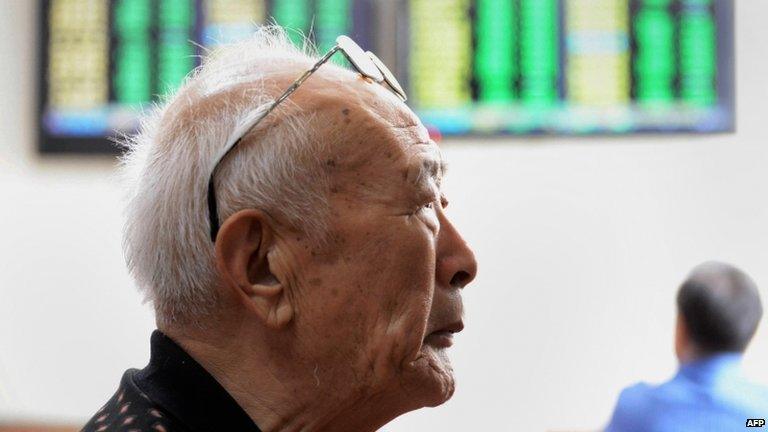Why is FTSE 100 shrugging off Shanghai Noon?
- Published

Chinese investors have been Shanghaied, but does Europe care?
So why on earth has the plunge in Chinese stock markets - Shanghai fell another 7.6% today, taking the losses on shares over four days to well over 20% - left European markets unperturbed this morning after yesterday's fall?
Well, it may well be that the absence of massive (or any) Chinese state intervention to prop up the market, of the sort we saw just a few weeks ago, has delivered some kind of coldish comfort to Western investors - for two reasons.
On the one hand, the lack of panic buying by Beijing's poodles implies the Chinese government does not believe that the economy is grinding to a halt in a devastating way, or that the share-price drops will damage the health of important financial institutions.
Paradoxically, Beijing actually looks more in control of the events that matter - in the short term at least - in not artificially inflating share prices and bailing out the 50 million to 90 million Chinese households who've been punting on the market.
That may, of course, just be an illusion.
Beijing will be hard pressed to meet its target of 7% GDP growth this year without doing the opposite of what is needed to put the economy on a sustainable footing, which is to curb debt-fuelled investment in infrastructure, construction and lame-duck heavy industries.
Also very difficult to gauge is the scale of the negative impact on the spending habits of investors whose wealth has been mullered and on the investing habits of companies whose share prices have been poleaxed.
But there is a serious risk of economic aftershocks from the market quake: multinationals with production in China aimed at Chinese consumers tell me they are significantly scaling back their manufacturing plans.
There is, however, one other positive gloss to put on the untrammelled Shanghai rout.
It is widely thought that the long-term sustainability of the Chinese economy requires Beijing to place more confidence in market forces and not mess with them before breakfast, lunch and tea. So in that sense, its neglect of stock markets today would be seen as benign, a sign that Beijing gets it (at last).
That said, the Chinese government is a million miles from understanding what true markets look like.
In a proper open economy, Shanghai's stock market turbulence would be the big talking point in China's media. But there is no mention of it anywhere in today's People's Daily newspaper - which is laughable even by the censorship standards of the People's Republic.
Two other things.
Tokyo's fall, in contrast to Europe's early rise, is simply because Japanese companies are so exposed to China.
And another reason why the UK market is up this morning, and Wall Street is expected to open higher, is that China's woes - and the slowdown in emerging markets in general - are seen to have delayed that fateful moment when the Bank of England and the Federal Reserve end our era of near-zero interest rates.
A rise in the Fed Funds rate in September now looks marginally less probable than my beloved Arsenal winning the Premier League this season (a zilch probability). And although it is still plausible that the Bank of England will raise interest rates next March, those on the Monetary Policy Committee who want a rise may yet be Shanghaied.
UPDATE 11:28
Spoke too soon. China has cut interest rates and so-called reserve ratios at banks, making it easier for banks to lend.
Plainly the market falls have spooked Beijing that its 7% growth target will be missed.
Ouch.
FURTHER UPDATE 11:34
The big point about today's Chinese monetary stimulus is: that may revive growth and the stock market in the short term - but it will further inflate China's dangerous debt bubble and will increase the longer-term risk of a crash.
As I said, ouch.